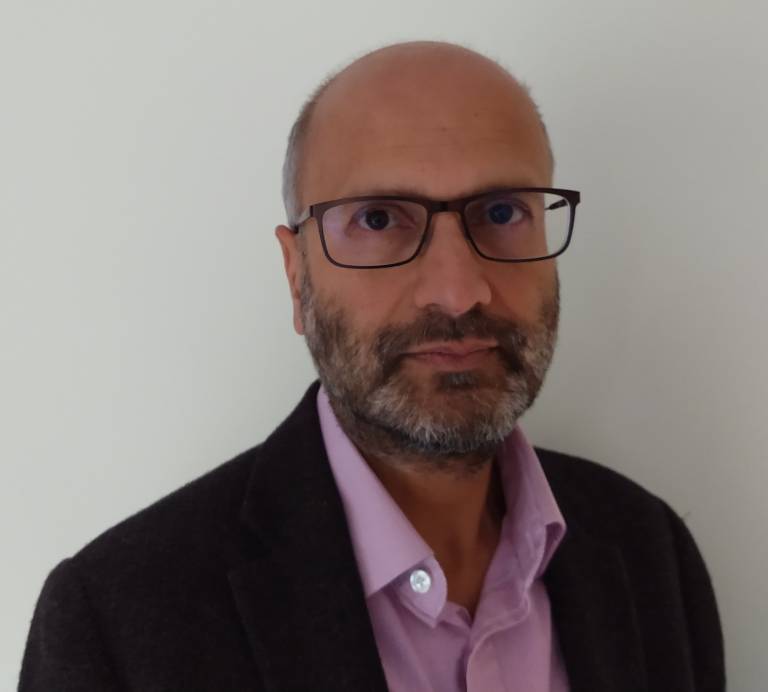Professor of Neurology leads on the impact of climate change on people with neurological conditions
5 November 2021
Professor Sanjay Sisodiya, consultant neurologist at the National Hospital for Neurology and Neurosurgery (UCLH) and Deputy Director at UCL Queen Square Institute of Neurology, is leading the way to investigate the impact of climate change on people with neurological conditions

Professor Sanjay Sisodiya, deputy director with responsibility for sustainability and climate change, has been concerned about the impact of climate change on people with neurological conditions for some time.
Aware of anecdotal evidence of difficulties experienced during heatwaves by people with some of the more severe forms of epilepsy, he consulted neurological colleagues both at NHNN and around the world to see if they had come across similar issues. Every colleague that he spoke to shared his concerns about the environment and acknowledged that they needed to think more seriously about the issue with regard to their patients. Other diseases of the brain and nervous system, including stroke, may also be sensitive to temperature changes.
Professor Sisodiya said: “We do think that climate change is going to be an important challenge for people with neurological diseases. In the case of some people with epilepsy, their families have noted over the past few years that during the heatwaves their condition has become worse.”
To address these issues, Professor Sisodiya established a consortium of neurologists, scientists, epilepsy nurses, representatives from industry and charities supporting people with epilepsy, called Epilepsy Climate Change (EpiCC). It is a global initiative to foster research and share knowledge in this area. He has also been awarded a £55,000 grant from The National Brain Appeal’s Innovation Fund, the charity that supports NHNN, to investigate the harmful effects of global heating on people with neurological conditions.
He continued: “We need to gather the fundamental data on how temperature affects the workings of the brain. Currently there is very little out there. The National Brain Appeal Innovation Fund grant will enable us to gather pilot data. We will undertake some pilot research projects and conduct surveys. It will be an important launch pad and hopefully enable us to secure larger funding to take this work further.”
"The world's climate is changing now. Global heating and its consequences will greatly affect our lives and work in the years ahead. For people with neurological diseases, and for research into those diseases, climate change is likely to pose significant challenges, which is in our remit and power to address. I very much look forward to working with neurological colleagues to do what we can to meet these challenges, to reduce our contributions to climate change, and to promote sustainability.”
Before the Covid pandemic started, Professor Sisodiya was already questioning the environmental impact of travelling to conferences around the world. Two years ago he planned a virtual conference that would have been UCL’s first online event, a novel concept at the time and now almost the norm due to Covid. The event was postponed due to the pandemic and will now take place on 25 November after the COP26 conference in Glasgow. Aimed at neurology experts who are climate curious, it will discuss the links between epilepsy and climate change, the promotion of awareness and research and the action that needs to be taken.
Although most clinical and research staff work hard to keep across information in their field, they may not always have the opportunity to look more widely at important developments apparently outside their own field, but that might have far-reaching consequences for their work.
He said: “We need to be more thoughtful. It’s not about putting a halt on advances in science or our understanding of disease or stopping talking to colleagues. It’s about asking if every meeting we want to go to is useful, or if the learning we get from it could be done remotely.”
“With our patients, we can learn from what we had to do in the pandemic and – where it is appropriate – make more of our consultations remote.”
“The National Brain Appeal’s Innovation Fund grant to investigate and mitigate the harmful effects of global heating on people affected by neurological conditions is an important first step towards pioneering ways to help people adapt and thrive despite the challenges ahead.”
Links
- Professor Sisodiya's UCLH profile
- Professor Sisodiya's UCL profile
- The National Brain Appeal’s Innovation Fund
- Epilepsy Climate Change (EpiCC)
- Glasgow Herald
- UCL Queen Square Institute of Neurology
 Close
Close

